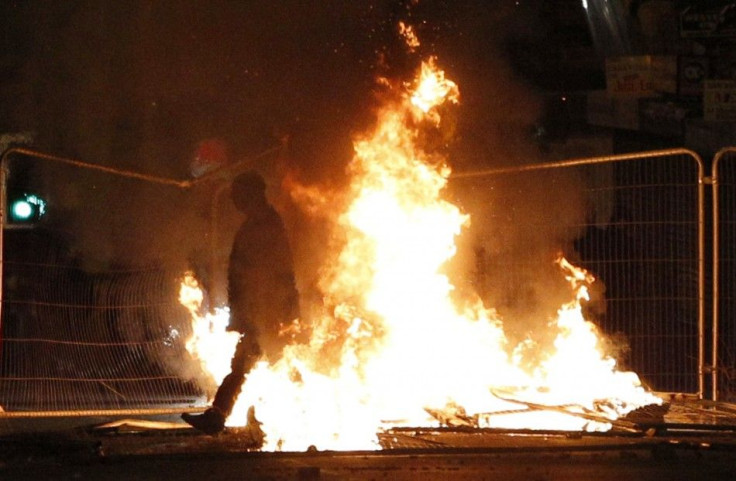UK Riots 2011: Inside the Mind of a Former Rioter
Opinion

I'm a rioter.
Well, let me rethink that -- I've been in a riot before.
It was back in March of 2010 after my alma mater, the University of Maryland, defeated its arch-rival, Duke, in basketball.
Students and fans alike had been looking forward to the game for a long time, so when Maryland was finally able to beat Duke it unleashed a wave of excitement, enthusiasm, and pure pandemonium.
Fans rushed onto the court to celebrate with the players, jumping up and down, high fiving each other, basking in the glory of the win.
But that's not the only place they rushed - thousands of fans also rushed the streets of Maryland's urban town center, College Park, looking to keep the celebration going.
What ended up happening was a wave of injured students, lawsuits against Maryland cops, and hordes of national television coverage on the subject of riots and police brutality.
How did an innocent win against a rival basketball team turn into a riot filled with burning trash cans and pepper spray galore?
It's due to a few factors but the three biggest appear to be alcohol, the effects of a mob mentality, and embracing a counter-culture against authority.
There is no doubt that alcohol played a part in the riots at Maryland, I know at least it did for me, and may have played a role in at least some of the riot destruction that is currently occurring in England.
The effects of alcohol are well-known to all, but it certainly can have a major impact on taking a peaceful action into a violent one. Alcohol gives more courage to do things, including incredibly stupid things, which led students at Maryland to throw beer bottles and other materials at police officers.
This leads up to the next point - the effects of a mob mentality. What happens is a few leaders, possibly inebriated, set the page for the rest of the group with a few actions. All it takes is a few "bad apples" to be violent for the situation to quickly escalate.
At Maryland, where it's been documented that police used too much force, a few students started to get out of hands and others started to follow suit. There is comfort in numbers, and most think that if everyone is doing it, then why can't I?
I never engaged police officers or did anything violent, but I sure as hell wanted to be around the action. I didn't want to miss out on what could be a memorable moment, and I think you're seeing a lot of this type of same mindset in England.
It's become an event at this point - if you're a British teen and you aren't involved in some way - you're missing out. As a teenager that could be one of the last things you want to experience.
This leads to what started as a small group amount growing to thousands and thousands of new participants. They may not be the leaders of the cause, but they want to be involved to an extent and could become violent in a certain situation.
Finally there is the issue of sticking it to authority. In my experience at the Maryland riots, a lot of the destruction was caused because of hatred towards police officers. After the authorities put on SWAT gear and began to physically push down students, pepper spray unsuspecting students, and overall use a great deal of force, there was a noticeable change in the tone of the crowd.
While there was certainly destruction beforehand, now it was aimed at cops and it got violent. Fires started sprouting up all along campus, and students got much more hostile towards police officers.
In England, clearly quite a bit of this counter-culture led riot is based on disdain for authorities. The movement allegedly started after a 27-year old man was shot and killed by police officers, setting off this dangerous and destructive chain of events.
Am I trying to say that a mild riot after a college basketball game is equivalent to a wide-spread riot over England?
Of course not.
My riot experience involved less than 50 arrests, for the most part mild injuries, and mostly served as a conversation starter on police brutality in the United States.
That clearly doesn't compare to the riots that have caused a handful of deaths and hundreds of arrests.
But even in their overall differences of severity, both have common denominators.
© Copyright IBTimes 2024. All rights reserved.











